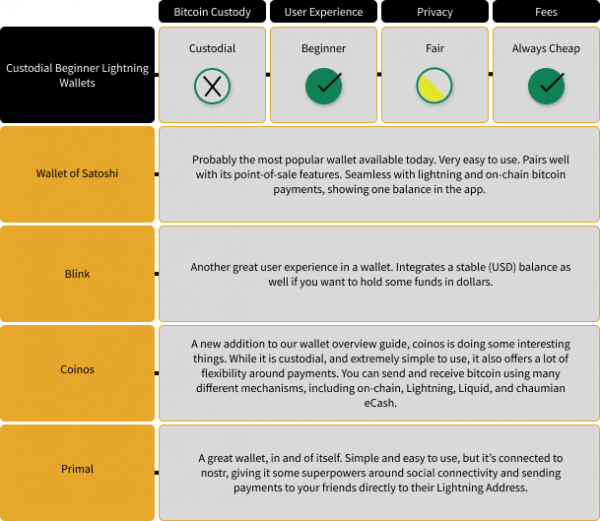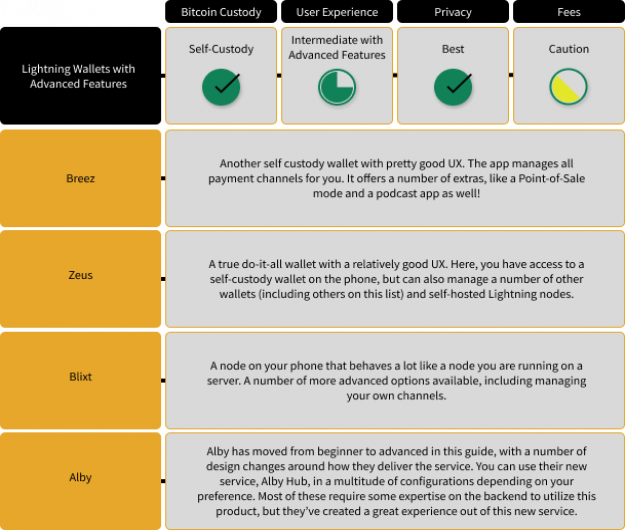Bitcoin Lightning Wallets
How to choose the one that's right for you.
Written by Brandon - Lightning Pay Team
Updated: November 18, 2024
What is a Bitcoin Lightning Wallet?
A Bitcoin Lightning wallet is a software that allows you to transact and view your bitcoin balance on the Bitcoin Lightning network.
These tools come in many shapes, sizes and flavours. Below, we do our best to discuss the various tradeoffs inherent to different kinds of wallets, and close with some general recommendations. Keep in mind, some of these will not be compatible with some Lightning Pay services, so check out our wallet compatibility article as well.
Before we begin, because the fees for transactions on the Bitcoin Lightning network are generally inexpensive (with some caveats, see below), we encourage you to try out many of these tools to find out which is right for you.
Our General Framework
Classifying these wallets is difficult, and there are many to choose from. To be considered here, a wallet must have a few key criteria met.
- Its main use case is compatible with the Bitcoin Lightning Network for sending payments.
- It isn't in early development, and is freely available to use.
- We aren't including software that is purpose built for managing your own infrastructure. A lot these will work as wallets, even very good ones, but this is too advanced for our purposes here.
- There are way too many wallets to cover them all. We're taking some editorial license to cover only those we think have significant market share, or interesting features.
Because the picture of Lightning Wallets has become a bit more variable over the past year or so, we're broadly creating 3 categories of wallet for you to consider. This revision of our overview article will consider that many wallets now have a lot of flexibility, and thus require consideration in multiple categories. The reason why will be explained in the description.
User Experience
Running the infrastructure for lightning payments yourself is complex. It involves managing a server, properly securing a hot wallet (always online), opening payment channels between counterparties, and managing liquidity.
Lightning wallets are designed to remove this complexity to varying degrees. Custodial options do this the best at the moment, because giving the custodian full control of the infrastructure allows them to remove all of the complexity.
But, there are a large number of options to choose from that have trade offs around user experience, and attempt to preserve self-custody for the user.
Below, we give 3 markers for UX in Bitcoin Lightning Wallets.
- Beginner - Wallets that are generally custodial, and maximise for an easy user experience. These are best for the user that is just getting started, and wants to explore with small amounts and learn the basics.
- Intermediate - These wallets are generally self-custodial, but have an interesting mix of features that make them a little more approachable than most self-custodial solutions. However, each of these have some tradeoffs that you should be aware of.
- Advanced - Wallets are given this designation if they have more advanced features and UX options. Most will have an easy mode, so will be labelled as intermediate/advanced. These features include node management (if you are running one yourself), channel management, or multi-wallet support. Best for those who have a good degree of knowledge about Bitcoin and the Lightning Network.
Custody
Our first discussion revolves around an important theme for Bitcoin, custody. In general, there are two groups of wallets. First, a self-custody wallet is one in which you alone control the bitcoin you own, with 100% capacity to control the location and destination of your funds.
The second type is a custodial wallet. Much like a bank account, these wallets provide you a balance, and give you the ability to transact, but in reality, you simply have an account with a third-party, who ultimately controls the bitcoin.
Lastly, there is a new model of custody emerging that is interoperable with the lightning network. Technologies like Liquid, Cashu, and Fedimint offer a different model of custody, where the bitcoin is held in custody by either a single custodian, or a group of custodians, and you are given custody of another asset, generally representing the bitcoin held by the custodian. The tradeoffs here are generally good but nuanced, and the subject of another article.
Privacy
The privacy of your payments may be something you consider important in choosing a wallet provider. In general terms, the more control you give to the wallet software (custody, channel operation and liquidity), the less privacy you will have from the company or person offering you the service. In general, you should not expect the companies behind these wallets to be untrustworthy, but if privacy is a concern for you, take this into consideration.
We will give these designations for wallet privacy:
Better - The best in class wallets offer as much privacy as possible in a Bitcoin Lightning or Mobile application.
Good - These wallets offer a number of privacy related features, but do make some compromises in design to provide a better experience
Fair - Generally, custodial wallets offer only a fair amount of privacy to users. This is because as a custodian, they work like a bank, and offer a similar level of privacy.
Costs and Fees
While the fees for payments on the Lightning Network are generally very inexpensive, because the Lightning Network is tied to Bitcoin Network transactions, costs can still be a consideration, depending on the wallet you choose.
Normal transaction fees for regular payments in almost every wallet will be inconsequential. However, if you are using a wallet that tries to keep as much control in the user's hands as possible, you may encounter costs when your payment channels do not have the liquidity required to make the requested payment.
We will note those where the user must be aware of the fees that may come from channels being opened to their self-custody wallet. Generally, all self custody wallets will come with added fees, but the hybrid wallets can lower this to some degree.
Lightning Wallet Breakdown
Beginner Lightning Wallets
These wallets are custodial, meaning you have an account, and the wallet provider holds bitcoin on your behalf. These are best for the user that is just getting started, and wants to explore with small amounts and learn the basics. If you want take a deeper dive, we have more coverage of the trade-offs presented to users by Custodial Lightning Wallets.

Intermediate Lightning Wallets
Generally these are self-custodial wallets, and will come with some user experience trade-offs. Best for the user who already has some knowledge about how Bitcoin works, and wants to try something with better security and privacy.

Advanced Lightning Wallets
Wallets are given this designation if they have more advanced features and UX options. Most will have an easy mode, so will be labelled as intermediate/advanced. These features include node management (if you are running one yourself), channel management, or multi-wallet support. Best for those who have a good degree of knowledge about Bitcoin and the Lightning Network.

Up and Coming - eCash (Cashu and Fedimint)
Some new technologies are in development that aim to provide a better user experience, and optimise the tradeoffs between custodial wallets and their clear ease-of-use benefits. These are wallets that integrate with the Lightning Network, but use a technology called Chaumian eCash.
We'll refrain from recommending these wallets as your daily driver just yet, but they are worth exploring if you're interested in the potential benefits of this emerging technology.
In brief, Chaumian eCash is a technology that allows a "Mint" to receive bitcoin payments on your behalf, and deposit tokens to your wallet, generally denominated in bitcoin (though they are something else entirely). The key benefits to eCash are:
- eCash users have near perfect privacy within the ecosystem of the mint, and can spend tokens to each other with amazing privacy.
- Transactions in these systems are fast, simple, and unlock quite a few advanced applications
- The UX when using these wallets is easy, you don't have to deal with any of the friction inherent to self-custody lightning wallets
- They are interoperable with the Bitcoin Lightning Network
The downside is that these systems do come with some risk, similar, but not the same as a custodial wallet. We're keeping a keen eye on this technology as it evolves. For now, if you want to learn more about these systems, you can learn more at the links below:
Fedi - A Wallet focused on the Fedimint implementation of eCash.
Cashu - An ecosystem of apps and wallets that are working on the Cashu eCash protocol.
You should consider these experimental at this stage, so don't use them with a lot of your bitcoin. But, given their promise, we'll keep an eye on how this part of the ecosystem evolves, and will incorporate this into our wallet breakdown as they mature.
Conclusion
The list above contains only the most popular Bitcoin Lightning Wallets available, there are many more to choose from, and an endless number of options. Luckily, with fees so low, there is no harm in giving a new wallet a try to find your preference.
There are new technologies and features being added to wallets regularly. We will do our best to keep this article up to date, but things move fast in Bitcoin. Lastly, be sure to check out our “Supported Wallets” article, as some of these wallets won’t be compatible with Lightning Network withdrawals on Lightning Pay.